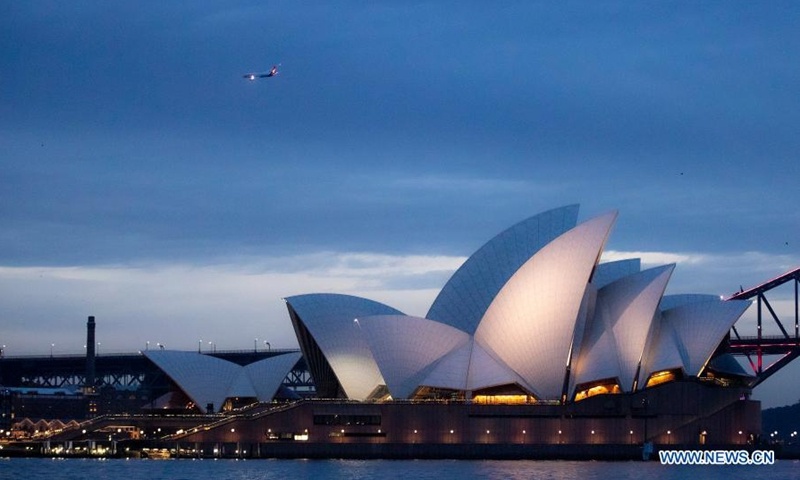
Sydney, Australia (Photo: Xinhua)
With a recent series of provocative actions by Australia targeting China, plus a long-lasting pandemic, Chinese students' enthusiasm for studying in Australia is cooling down, as dozens of them reached by the Global Times expressed their reluctance to choose the country, citing infection risks and worsening bilateral ties that have created an anti-China atmosphere in the down under.
From September to January each year, hundreds of thousands of Chinese students send applications to overseas schools, among which Australian ones have ranked first to get Chinese applications. But these schools are losing appeal, seen from a slowing in the increase of Chinese students, a trend that analysts predicted would continue for another one to two years.
The Global Times recently talked with about 50 graduating students and their parents from cities including Beijing and Shanghai, and half of them had decided not to choose Australia for overseas study.
Tian, a senior at a Guangzhou university, said that she had considered applying to schools in Australia earlier this year, but later "lost trust" in the Morrison administration after seeing shifting entry policies during the pandemic that left some Chinese students stranded abroad.
"The unstable policy is obviously a concern for me," Tian said. "If I go to Australia to study, I'm not sure if I will encounter a similar situation."
For other students considering studying in Australia, other factors have created additional concerns.
A student surnamed Xu, who enrolled in the University of Sydney in September, said that one of the important reasons for choosing a school was the "perceived pleasant liberal atmosphere and the friendliness of local people."
"But recently, we've clearly felt an increase in hostility toward Chinese students in Australia," Xu said. "If I could reapply, I might not put Australia as my first choice."
From the politicized calls for an inquiry into the origins of COVID-19 and claims earlier this year that Chinese spies have penetrated Australian communities and universities, to the recent interference in China's Hong Kong affairs, a joint defense pact with Japan targeting China, and Australian prime minister's tough denial that Australia acted at the behest of the US in crafting its foreign policy, which poisoned bilateral relations, Australia's erroneous China policy has continuously worsened bilateral ties.
Some students, who are worried that China-Australia relations would worsen, decided to switch to Singapore, China's Hong Kong Special Administrative Region (SAR) or the Macao SAR for their further studies.
A PhD candidate surnamed Liu, who had received an offer from Monash University in Melbourne, said he decided to give up the offer after he was forced to wait time and again for Australia's travel ban to be lifted amid the COVID-19 outbreak.
Liu is considering applying for Hong Kong universities as he felt more "secure" after the national security law for the city took effect.
Many other students have similar feelings, and several overseas study agents told the Global Times that applications for Hong Kong schools have surged this year.
"The number of applications we received for studying in Australia this year did not greatly increase as we had expected, but we didn't see an obvious decrease" either, said a Beijing-based overseas studying agent, who gave her name as Ann.
But the flattened curve of Chinese students in Australia actually indicates the country's dropping appeal, given the trend in the past decade when surging numbers of Chinese students headed to the country.
According to data from the Australian Department of Education, the number of visas issued to Chinese students in Australia increased from about 150,000 in 2012 to 261,000 in 2019.
Chinese students made up about 38 percent of international students in Australian higher education in 2019. Due to COVID-19 epidemic concerns and policies toward China, this figure fell to 25 percent this year, Reuters reported.
Ann noted that more and more students have expressed their concerns about studying in Australia, including the Australian government's hostile policies, and the increased hostility of Australians toward Chinese.
Yu Lei, chief research fellow at the Research Center for Pacific Island Countries at Liaocheng University, told the Global Times that there may not be a serious rethinking of China-Australia relations among Australian politicians until next June, and Australia's China policy will depend on the new US administration.
Analysts in the education industry said amid the uncertainties in bilateral relations, the willingness of Chinese students to study in Australia may not rebound in the next one or two years.
Besides prospective students, students already enrolled are also changing their plans. A student surnamed Meng, who studied in Australia but left the country due to the pandemic, decided to abandon his degree and make a living in Beijing. "I was shocked when informed by the immigration departments that I was not able to finish my studies in Australia or even go back to the country to pack my belongings," Meng said.
"Then I made up my mind and told my professors that I would quit because it's not worth it to study in Australia anymore," Meng said.
Luo, a father whose daughter is studying in Australia and had planned to emigrate to the country, decided to withdraw her emigration application.
"My daughter has been studying in Australia since high school and adapted to the environment. However, Australia is becoming more and more unsafe since the pandemic. We all agree that returning to and staying in China is the best choice for our family."


